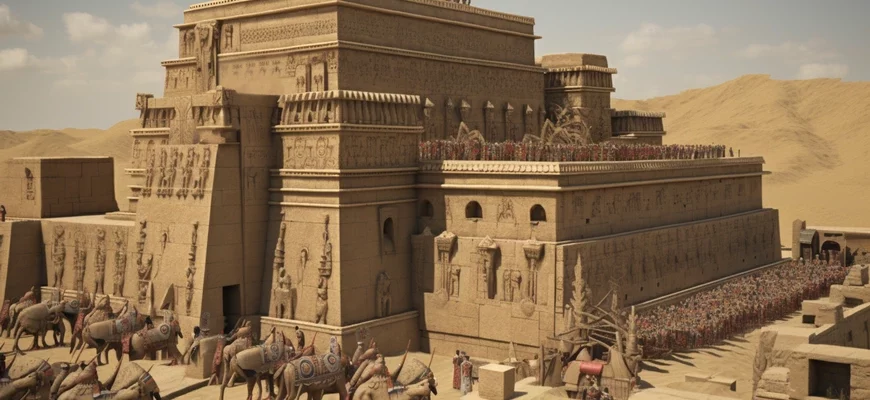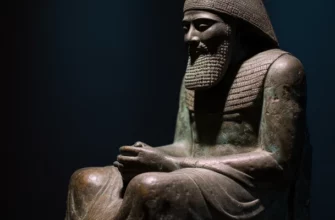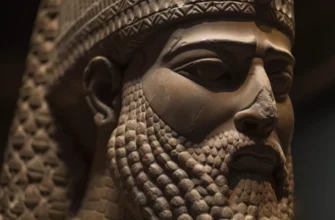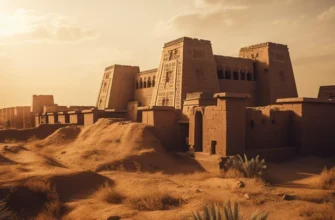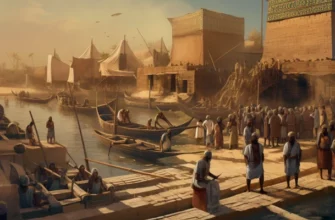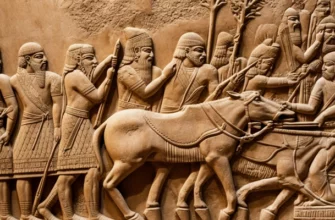The Sumerians were one of the first civilizations in human history. They created city-states with complex political structures and religious beliefs. In addition, the social structure of Sumer was known for its classifications of the population and the evolution of social structures. Sumerian culture had a major impact on world history, spreading cultural achievements that played an important role in the formation of the legal system and political institutions. Studying the political history of Sumer is important for understanding the origins and development of civilization and can provide directions for further research.
The formation of city-states in Sumer
The formation of city-states in Sumer is one of the most important branches of the political history of this civilization. According to legend, the first cities in Sumer appeared around 4000 BC, when people began to unite around infrastructure to provide water supply and irrigation.
The main city-states in Sumer were Ur, Uruk, Lagash, and Nippur. Each of them had a complex political structure that included a ruler (en-si), a council of elders (gir), and a military elite (lu).
In the first half of the 3rd millennium BC, the city-states of Sumer began to compete with each other and were involved in numerous wars. As a result, a more complex political system was created, which included federations of city-states and empires, such as the Akkadian Empire.
The formation of city-states in Sumer played an important role in the development of political and administrative institutions, which played an important role in the further development of world civilization.
Prerequisites for the formation of city-states
The prerequisites for the formation of city-states in Sumer were related to several factors. The first was the location of this territory in the crescent zone, where there was sufficient irrigation and soil fertility for agriculture.
Another important factor was the development of an irrigation system, which ensured the irrigation of land and increased crop yields. This, in turn, led to population growth and the development of a social system, which necessitated the creation of a centralized government.
Thus, the prerequisites for the formation of city-states in Sumer were a favorable location and climatic conditions, the development of agriculture and crafts, an irrigation system, and the need for centralized government.
The main city-states of the Sumerians
Sumer was one of the first civilized regions in the world where the first city-states emerged. The main city-states of Sumer were Ur, Uruk, Lagash, Nippur, Eridu, and Kish.
Ur was one of the largest and most important city-states of Sumer. Ur was a center of culture and science, as well as military power, which allowed the city to defend its interests and participate in wars with neighboring cities.
Uruk was also a large city-state with a large population and a developed economy. Uruk was known for its public buildings, such as the ziggurat, which became a symbol of the city’s power and strength.
Lagash was a center for metal production and a developed irrigation system. Nippur was known for its library, which contained a significant amount of literature and other written sources.
Eridu was one of the oldest city-states of Sumer and had a great influence on the development of the culture and religion of the region. Kish was one of the first city-states of Sumer and played an important role in shaping the political system of the region.
Religious beliefs of Sumer
The Sumerians were one of the earliest civilizations of humanity, existing in the Mesopotamia region (in modern-day Iraq) more than 4,000 years ago. The religious beliefs of the Sumerians were polytheistic—they had many gods and goddesses, each responsible for a specific aspect of life.
Sumerian religion had a strong influence on subsequent civilizations, including the Babylonians, Egyptians, Greeks, and Romans. Some ideas, such as the existence of the soul after death and the ancient Greek myth of Persephone and Heracles, may have been borrowed from Sumerian religion.
The Sumerians believed in the existence of gods who controlled natural phenomena such as the sun, moon, and stars, and influenced various aspects of human life, including health, wealth, and family happiness. One of the most famous Sumerian gods was Anu, the god of the sky, who was considered the chief god. Other important gods included Enlil, the god of air and wind, and Inanna, the goddess of love and war.
Sumerian religion included various rituals and ceremonies, including sacrifices, prayers, and magic spells. They also believed in well-known cult figures such as harmony, ceramics, horseshoes, and others.
In Sumerian religion, it was believed that people should serve the gods, fulfill their wishes, and ask for protection and help in all aspects of life. To attract the attention of the gods, the Sumerians held various religious ceremonies and festivals, such as the New Year festival dedicated to the goddess Inanna.
One of the important aspects of Sumerian religion was the belief in life after death. The Sumerians believed that after death, the human soul passes into the underworld, where it is judged according to its actions on earth. To help the souls of the dead, the relatives of the Sumerians often held religious ceremonies and prayers.
Sumerian religion also included the concept of demons and negative forces that could influence a person’s life. To protect themselves from these forces, the Sumerians used amulets and magic spells.
In general, Sumerian religion had a significant influence on the development of the beliefs and cultures of many peoples of the world. It reflected the beliefs of the time and became the basis for the further development of religious traditions that emerged later.
The influence of Sumer on world history
The social structure of the Sumerians was quite complex and hierarchical. It included several social groups, each with its own characteristics and functions.
At the top of the social pyramid were the rulers, who usually held political and economic power. They represented the richest and most influential families who owned land and other resources. The rulers had their supporters and subordinates who carried out their orders and ensured their power.
The next level of the social pyramid consisted of the clergy, which included priests and priests. The clergy played an important role in the life of the Sumerians, as they served as intermediaries between people and gods, performed religious rites and prayers.
The next level consisted of the military and noble warriors, who were the largest groups after the rulers and clergy. They played an important role in defending the territory and conducting reconnaissance for the rulers.
Finally, the lowest level of the social pyramid consisted of peasants and artisans who were engaged in agriculture and crafts. They provided the economic base of Sumerian civilization and were the main labor force.
Overall, the social structure of the Sumerians was quite complex and hierarchical, with different social groups having different functions and privileges.
Sumer’s influence on the legal system and political institutions
The Sumerians were one of the first civilizations to develop a complex legal system and political institutions. Their innovations in these areas influenced the further development of law and politics in the East and West.
The Sumerian legal system was highly developed and consisted of various laws and regulations governing different aspects of life. For example, they had laws on crimes and punishments, property, debt and bankruptcy, marriage and family, business activities, and more. The Sumerians were the first in history to create written laws, which were stored on clay tablets, known as “泥板”.
The Sumerians also developed political institutions that played an important role in their society. They had city councils that discussed issues of local importance, as well as a city guard that was responsible for security and order in the city. In addition, the Sumerians had a monarchy that wielded considerable power but was limited by legal norms and accountability to the council.
The Sumerians also invented an accounting and taxation system that was extremely effective and helped them collect the resources necessary for their society to function. They developed various forms of taxation, including taxes on land, food, crafts, and more.
All of these achievements of the Sumerians in the field of law and politics were significant contributions to the development of civilization. They opened up new opportunities for the development of the legal system and political institutions, in particular by involving broader segments of the population in decision-making. In addition, their innovations in accounting and taxation became the basis for the development of economics and finance.
All these achievements gave impetus to the further development of civilization. Many of the laws and norms developed by the Sumerians were used in the subsequent legal practice of other peoples, and their ideas about democracy and political participation were of great importance in the formation of subsequent political institutions.
Thus, the influence of the Sumerians on the legal system and political institutions was great and invaluable. Their achievements were important steps in the development of civilization, laying the foundation for the further development of law, politics, and economics.
Conclusions
The political history of Sumer is a very important branch of history, which testifies to the development of political systems in the Mesopotamia region. The Sumerians occupy a prominent place in history as the first known civilization in the world, which arose in the southwestern part of the Ancient Near East in the 4th-3rd millennia BC. Based on cuneiform writing, this civilization developed in the territory of modern Iraq.
The main branches of Sumerian political history:
Social structure – The Sumerians had a complex hierarchical social structure consisting of two upper classes – monarchs and clergy – as well as various strata of the population, which were divided according to professional and social affiliation.
Legal system – The Sumerians were the first people to invent written law and a system of laws that regulated society. Sumerian laws were written on clay tablets and contained rules on property, marriage, crimes, trade, and more.
Political institutions – The Sumerians developed military and administrative institutions, such as various types of troops, local governments, and state institutions. In addition, the Sumerians invented a form of democracy in which the people had the right to vote at general assemblies and make important decisions.
The importance of studying the political history of Sumer:
Studying the political history of Sumer is important in the context of world history because the Sumerians had a significant influence on the formation of various aspects of society. Their inventions and achievements in the fields of law, politics, and culture have left a significant mark on world history.
In particular, understanding how the Sumerians shaped their political and legal systems can help in understanding the development of modern political and legal institutions. Many of their inventions and discoveries are still in use today, such as the use of clay tablets in writing, inventions in agriculture, architecture, and more.
Studying the political history of Sumer can also help us understand the processes of globalization and interaction between peoples and cultures. The Sumerians were pioneers in shaping intercultural dialogue and mutual influence, which was an important element in the formation of world civilization.
Therefore, studying the political history of Sumer is important for understanding the development of world history and culture. The Sumerians made a significant contribution to the formation of various aspects of society, and their achievements became an important stage in the development of world civilization.
